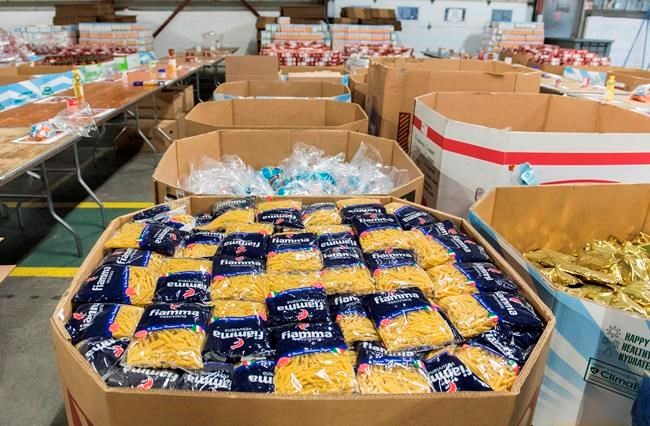MONTREAL — Increasing demand for food assistance this year, coupled with a regular spike in users during the holiday season, has strained Canadian food banks this month, the directors of multiple Canadian food bank associations say.
"Christmas is always a busy time for our food banks but particularly when you add Christmas ... plus the regular need throughout the month of December has been increased, it just puts even more pressure on the food banks," said Shawna Bissell, executive director of Food Banks Alberta, a network of over 100 local organizations in the province.
Organizations across the country have reported an increase in users this year. National network Food Banks Canada counted 1,935,911 visits to food banks in March — the latest data available — a 32.1 per cent increase from March 2022 and a 78.5 per cent jump from March 2019.
In Ontario, visits surged 36 per cent — to 5,888,685 — between April 2022 and March 2023 compared to the previous year, according to a November release from Feed Ontario.
Bissell said demand is so high in her network that it's unable to build up food reserves. "As soon as that food is coming it’s being distributed out to people in need," she said in an interview. "Every year we seem to be feeding more and more people."
On the other side of the country, Food Banks of Quebec executive director Martin Munger said his organization this year distributed twice the number of aid packages it handed out in 2019. It gave out tens of thousands of food baskets in the run-up to Christmas, alone, he said. Now, stocks are low.
Demand, he said, has "been high all year long, and it's also been higher during the holiday season than in previous years."
Dan Huang-Taylor, executive director of Food Banks BC, said 2023 has seen the highest level of demand for food banks since they started operating in British Columbia in the early 1980s.
Huang-Taylor said December has seen an increase in support alongside the growing demand for food banks.
"We see a lot more people giving over the course of December as well. Food and funds and other ways that people can help out, like say, volunteering, that can offset some of the increase in demand that we see," he said.
Despite the challenges, Bissell, Huang-Taylor and Munger expect to continue to be able to pull together enough funds and donations to meet demand without turning people away. But Munger hopes the government will implement more sustainable solutions to help people feed themselves rather than resort to food banks, an emergency resource that now serves one in 10 Quebecers, he said.
"It has to stop increasing," he said. "It's not tenable and food banks weren't developed to respond to demand on this scale on an ongoing basis."
The concern over sustainability is echoed by Huang-Taylor, who said support should include improvements like more affordable housing and higher rates of social assistance or other programs for people in need.
"We need to see some interventions that will reduce the strain on food banks, beyond just providing more money or more food. (We need) more preventative measures that will alleviate that strain and mean that someone doesn't have to turn to the food bank to put food on their table," he said.
- With files from Ashley Joannou in Vancouver
This report by The Canadian Press was first published Dec. 30, 2023.
Thomas MacDonald, The Canadian Press




